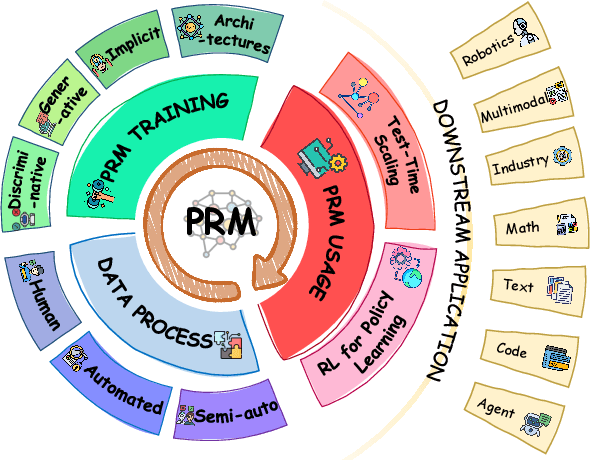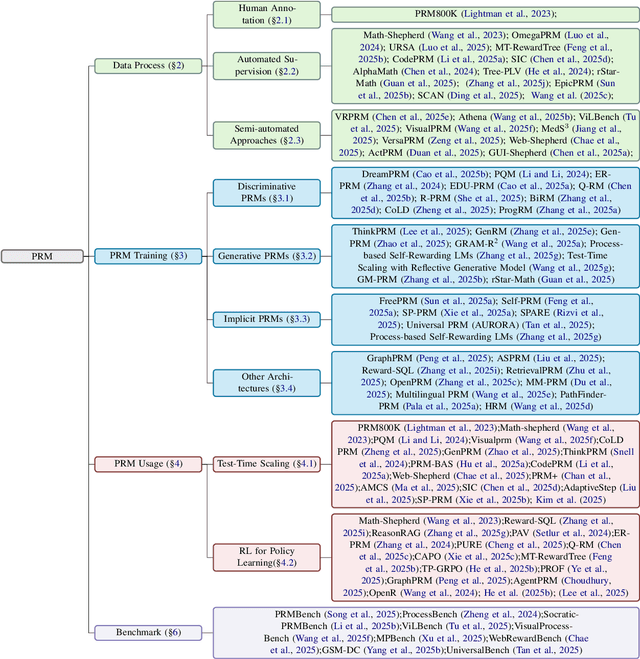Jianghao Lin
OSCAR: Optimization-Steered Agentic Planning for Composed Image Retrieval
Feb 09, 2026Abstract:Composed image retrieval (CIR) requires complex reasoning over heterogeneous visual and textual constraints. Existing approaches largely fall into two paradigms: unified embedding retrieval, which suffers from single-model myopia, and heuristic agentic retrieval, which is limited by suboptimal, trial-and-error orchestration. To this end, we propose OSCAR, an optimization-steered agentic planning framework for composed image retrieval. We are the first to reformulate agentic CIR from a heuristic search process into a principled trajectory optimization problem. Instead of relying on heuristic trial-and-error exploration, OSCAR employs a novel offline-online paradigm. In the offline phase, we model CIR via atomic retrieval selection and composition as a two-stage mixed-integer programming problem, mathematically deriving optimal trajectories that maximize ground-truth coverage for training samples via rigorous boolean set operations. These trajectories are then stored in a golden library to serve as in-context demonstrations for online steering of VLM planner at online inference time. Extensive experiments on three public benchmarks and a private industrial benchmark show that OSCAR consistently outperforms SOTA baselines. Notably, it achieves superior performance using only 10% of training data, demonstrating strong generalization of planning logic rather than dataset-specific memorization.
A Survey of Process Reward Models: From Outcome Signals to Process Supervisions for Large Language Models
Oct 09, 2025


Abstract:Although Large Language Models (LLMs) exhibit advanced reasoning ability, conventional alignment remains largely dominated by outcome reward models (ORMs) that judge only final answers. Process Reward Models(PRMs) address this gap by evaluating and guiding reasoning at the step or trajectory level. This survey provides a systematic overview of PRMs through the full loop: how to generate process data, build PRMs, and use PRMs for test-time scaling and reinforcement learning. We summarize applications across math, code, text, multimodal reasoning, robotics, and agents, and review emerging benchmarks. Our goal is to clarify design spaces, reveal open challenges, and guide future research toward fine-grained, robust reasoning alignment.
StepORLM: A Self-Evolving Framework With Generative Process Supervision For Operations Research Language Models
Sep 26, 2025Abstract:Large Language Models (LLMs) have shown promising capabilities for solving Operations Research (OR) problems. While reinforcement learning serves as a powerful paradigm for LLM training on OR problems, existing works generally face two key limitations. First, outcome reward suffers from the credit assignment problem, where correct final answers can reinforce flawed reasoning. Second, conventional discriminative process supervision is myopic, failing to evaluate the interdependent steps of OR modeling holistically. To this end, we introduce StepORLM, a novel self-evolving framework with generative process supervision. At its core, StepORLM features a co-evolutionary loop where a policy model and a generative process reward model (GenPRM) iteratively improve on each other. This loop is driven by a dual-feedback mechanism: definitive, outcome-based verification from an external solver, and nuanced, holistic process evaluation from the GenPRM. The combined signal is used to align the policy via Weighted Direct Preference Optimization (W-DPO) and simultaneously refine the GenPRM. Our resulting 8B-parameter StepORLM establishes a new state-of-the-art across six benchmarks, significantly outperforming vastly larger generalist models, agentic methods, and specialized baselines. Moreover, the co-evolved GenPRM is able to act as a powerful and universally applicable process verifier, substantially boosting the inference scaling performance of both our own model and other existing LLMs.
Generative Representational Learning of Foundation Models for Recommendation
Jun 16, 2025Abstract:Developing a single foundation model with the capability to excel across diverse tasks has been a long-standing objective in the field of artificial intelligence. As the wave of general-purpose foundation models sweeps across various domains, their influence has significantly extended to the field of recommendation systems. While recent efforts have explored recommendation foundation models for various generative tasks, they often overlook crucial embedding tasks and struggle with the complexities of multi-task learning, including knowledge sharing & conflict resolution, and convergence speed inconsistencies. To address these limitations, we introduce RecFound, a generative representational learning framework for recommendation foundation models. We construct the first comprehensive dataset for recommendation foundation models covering both generative and embedding tasks across diverse scenarios. Based on this dataset, we propose a novel multi-task training scheme featuring a Task-wise Mixture of Low-rank Experts (TMoLE) to handle knowledge sharing & conflict, a Step-wise Convergence-oriented Sample Scheduler (S2Sched) to address inconsistent convergence, and a Model Merge module to balance the performance across tasks. Experiments demonstrate that RecFound achieves state-of-the-art performance across various recommendation tasks, outperforming existing baselines.
DLF: Enhancing Explicit-Implicit Interaction via Dynamic Low-Order-Aware Fusion for CTR Prediction
May 25, 2025Abstract:Click-through rate (CTR) prediction is a critical task in online advertising and recommender systems, relying on effective modeling of feature interactions. Explicit interactions capture predefined relationships, such as inner products, but often suffer from data sparsity, while implicit interactions excel at learning complex patterns through non-linear transformations but lack inductive biases for efficient low-order modeling. Existing two-stream architectures integrate these paradigms but face challenges such as limited information sharing, gradient imbalance, and difficulty preserving low-order signals in sparse CTR data. We propose a novel framework, Dynamic Low-Order-Aware Fusion (DLF), which addresses these limitations through two key components: a Residual-Aware Low-Order Interaction Network (RLI) and a Network-Aware Attention Fusion Module (NAF). RLI explicitly preserves low-order signals while mitigating redundancy from residual connections, and NAF dynamically integrates explicit and implicit representations at each layer, enhancing information sharing and alleviating gradient imbalance. Together, these innovations balance low-order and high-order interactions, improving model expressiveness. Extensive experiments on public datasets demonstrate that DLF achieves state-of-the-art performance in CTR prediction, addressing key limitations of existing models. The implementation is publicly available at https://github.com/USTC-StarTeam/DLF.
Superplatforms Have to Attack AI Agents
May 23, 2025Abstract:Over the past decades, superplatforms, digital companies that integrate a vast range of third-party services and applications into a single, unified ecosystem, have built their fortunes on monopolizing user attention through targeted advertising and algorithmic content curation. Yet the emergence of AI agents driven by large language models (LLMs) threatens to upend this business model. Agents can not only free user attention with autonomy across diverse platforms and therefore bypass the user-attention-based monetization, but might also become the new entrance for digital traffic. Hence, we argue that superplatforms have to attack AI agents to defend their centralized control of digital traffic entrance. Specifically, we analyze the fundamental conflict between user-attention-based monetization and agent-driven autonomy through the lens of our gatekeeping theory. We show how AI agents can disintermediate superplatforms and potentially become the next dominant gatekeepers, thereby forming the urgent necessity for superplatforms to proactively constrain and attack AI agents. Moreover, we go through the potential technologies for superplatform-initiated attacks, covering a brand-new, unexplored technical area with unique challenges. We have to emphasize that, despite our position, this paper does not advocate for adversarial attacks by superplatforms on AI agents, but rather offers an envisioned trend to highlight the emerging tensions between superplatforms and AI agents. Our aim is to raise awareness and encourage critical discussion for collaborative solutions, prioritizing user interests and perserving the openness of digital ecosystems in the age of AI agents.
The Real Barrier to LLM Agent Usability is Agentic ROI
May 23, 2025Abstract:Large Language Model (LLM) agents represent a promising shift in human-AI interaction, moving beyond passive prompt-response systems to autonomous agents capable of reasoning, planning, and goal-directed action. Despite the widespread application in specialized, high-effort tasks like coding and scientific research, we highlight a critical usability gap in high-demand, mass-market applications. This position paper argues that the limited real-world adoption of LLM agents stems not only from gaps in model capabilities, but also from a fundamental tradeoff between the value an agent can provide and the costs incurred during real-world use. Hence, we call for a shift from solely optimizing model performance to a broader, utility-driven perspective: evaluating agents through the lens of the overall agentic return on investment (Agent ROI). By identifying key factors that determine Agentic ROI--information quality, agent time, and cost--we posit a zigzag development trajectory in optimizing agentic ROI: first scaling up to improve the information quality, then scaling down to minimize the time and cost. We outline the roadmap across different development stages to bridge the current usability gaps, aiming to make LLM agents truly scalable, accessible, and effective in real-world contexts.
InfoDeepSeek: Benchmarking Agentic Information Seeking for Retrieval-Augmented Generation
May 21, 2025Abstract:Retrieval-Augmented Generation (RAG) enhances large language models (LLMs) by grounding responses with retrieved information. As an emerging paradigm, Agentic RAG further enhances this process by introducing autonomous LLM agents into the information seeking process. However, existing benchmarks fall short in evaluating such systems, as they are confined to a static retrieval environment with a fixed, limited corpus} and simple queries that fail to elicit agentic behavior. Moreover, their evaluation protocols assess information seeking effectiveness by pre-defined gold sets of documents, making them unsuitable for the open-ended and dynamic nature of real-world web environments. To bridge this gap, we present InfoDeepSeek, a new benchmark with challenging questions designed for assessing agentic information seeking in real-world, dynamic web environments. We propose a systematic methodology for constructing challenging queries satisfying the criteria of determinacy, difficulty, and diversity. Based on this, we develop the first evaluation framework tailored to dynamic agentic information seeking, including fine-grained metrics about the accuracy, utility, and compactness of information seeking outcomes. Through extensive experiments across LLMs, search engines, and question types, InfoDeepSeek reveals nuanced agent behaviors and offers actionable insights for future research.
A Survey of AI Agent Protocols
Apr 23, 2025Abstract:The rapid development of large language models (LLMs) has led to the widespread deployment of LLM agents across diverse industries, including customer service, content generation, data analysis, and even healthcare. However, as more LLM agents are deployed, a major issue has emerged: there is no standard way for these agents to communicate with external tools or data sources. This lack of standardized protocols makes it difficult for agents to work together or scale effectively, and it limits their ability to tackle complex, real-world tasks. A unified communication protocol for LLM agents could change this. It would allow agents and tools to interact more smoothly, encourage collaboration, and triggering the formation of collective intelligence. In this paper, we provide a systematic overview of existing communication protocols for LLM agents. We classify them into four main categories and make an analysis to help users and developers select the most suitable protocols for specific applications. Additionally, we conduct a comparative performance analysis of these protocols across key dimensions such as security, scalability, and latency. Finally, we explore future challenges, such as how protocols can adapt and survive in fast-evolving environments, and what qualities future protocols might need to support the next generation of LLM agent ecosystems. We expect this work to serve as a practical reference for both researchers and engineers seeking to design, evaluate, or integrate robust communication infrastructures for intelligent agents.
AdvKT: An Adversarial Multi-Step Training Framework for Knowledge Tracing
Apr 07, 2025Abstract:Knowledge Tracing (KT) monitors students' knowledge states and simulates their responses to question sequences. Existing KT models typically follow a single-step training paradigm, which leads to discrepancies with the multi-step inference process required in real-world simulations, resulting in significant error accumulation. This accumulation of error, coupled with the issue of data sparsity, can substantially degrade the performance of recommendation models in the intelligent tutoring systems. To address these challenges, we propose a novel Adversarial Multi-Step Training Framework for Knowledge Tracing (AdvKT), which, for the first time, focuses on the multi-step KT task. More specifically, AdvKT leverages adversarial learning paradigm involving a generator and a discriminator. The generator mimics high-reward responses, effectively reducing error accumulation across multiple steps, while the discriminator provides feedback to generate synthetic data. Additionally, we design specialized data augmentation techniques to enrich the training data with realistic variations, ensuring that the model generalizes well even in scenarios with sparse data. Experiments conducted on four real-world datasets demonstrate the superiority of AdvKT over existing KT models, showcasing its ability to address both error accumulation and data sparsity issues effectively.
 Add to Chrome
Add to Chrome Add to Firefox
Add to Firefox Add to Edge
Add to Edge